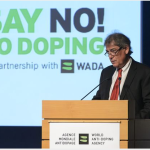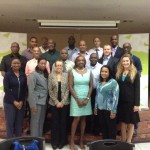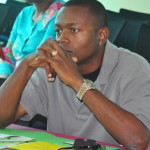
Director General of the WADA, David Howman speaks during the World Anti-Doping Agency, WADA, symposium in Lausanne, Switzerland, Tuesday, March 24, 2015. Photo: AP Photo/Keystone, Jean-Christophe Bott
Ephraim Penn, representing the VI National Anti-Doping Organisation (NADO) attended the 11th edition of the World Anti-Doping Agency’s (WADA) annual Symposium for Anti-Doping Organizations (ADOs) from March 24-26 in Lausanne, Switzerland. More than 470 anti-doping experts from regions across the world met for the largest annual gathering of anti-doping practitioners.
Representatives from International Sport Federations (IFs), NADOs, Regional Anti-Doping Organizations (RADOs), Major Games Organizers, WADA’s Athlete Committee and, for the first time, from WADA accredited laboratories and the media, discussed concrete ways and means of ‘Optimizing the Practice of the 2015 World Anti-Doping Code’ – the theme of this year’s Symposium.
This year’s edition of the Symposium provided participants with a number of new features. This included a full day of practical workshops and training sessions related to education, testing, intelligence and investigations, the Athlete Biological Passport, results management, therapeutic use exemptions, ADAMS, and other key areas of the fight for clean sport.
“This symposium is extremely helpful in terms of our on-the-ground activity in the Virgin Islands,” said Penn, is a RADO board member and also sits as president of the BVIOC. “We’ve been pursuing the anti-doping education of our athletes and support community since we were officially signed on as a NADO in 2012.
“Our Doping Control Officers have conducted in- and out-of competition testing of athletes representing the VI in athletics, squash, swimming, skiing, and power lifting as required by their respective international governing bodies. Now it’s time to focus on education beyond advising and testing athletes.”
A number of discussion panels on the first day addressed topics such as the influence of the athletes, their entourage and the media on the fight against doping in sport. These sessions provided participants with the opportunity to interact with the members of WADA’s Athlete Committee, as well as a number of high-profile whistleblowers and specialized reporters.
“What was discussed over the couple of days ties in well with our plans in the VI to expand our reach deeper into the community with value-based education,” said Penn.” We have put it in an application for a local project grant from UNESCO which will help with our efforts.”
“We have entered into a new era of anti-doping,” said WADA Director General David Howman, who delivered an introductory presentation on ADOs’ responsibility following the opening address of WADA Vice President, Rev. Dr. Makhenkesi A. Stofile. “With the new Code in place, the world anti-doping community has a renewed responsibility to preserve the integrity of sport. That was the purpose of this Symposium: to get into the details of ADOs’ responsibilities and provide them with additional tools to deliver our collective promise of protecting the rights of all those who reject doping. WADA looks forward to continuing to work with all of its stakeholders in the pursuit of this mission.”

